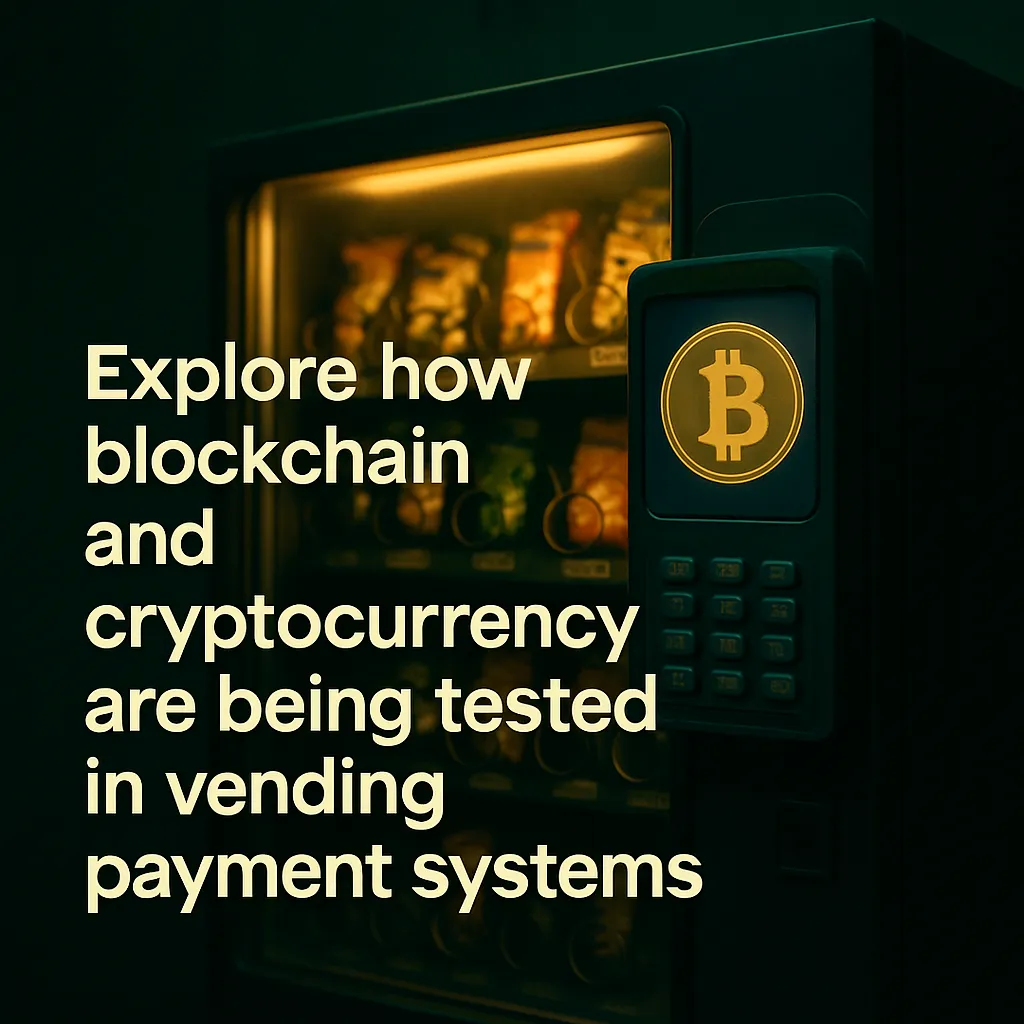Blockchain in Vending Payments: The Future of Transactions
Explore how blockchain and cryptocurrency are being tested in vending payment systems.
Back to Vending Technology ResourcesExplore how blockchain and cryptocurrency are being tested in vending payment systems.
Back to Vending Technology ResourcesIntegrating blockchain and cryptocurrency into vending machines offers enhanced security, transparency, and a novel payment experience for consumers.
![]() Faster, more secure transactions for vending operations
Faster, more secure transactions for vending operations
![]() Reduced fees compared to traditional payment processors
Reduced fees compared to traditional payment processors
![]() Attracts tech-savvy customers seeking innovative payment options
Attracts tech-savvy customers seeking innovative payment options

The vending industry, always on the lookout for efficiency and consumer convenience, is beginning to explore the transformative potential of blockchain technology and cryptocurrency payments. This innovative approach promises a new era of secure, transparent, and potentially lower-cost transactions for vending machine purchases. While still in its early stages of adoption, integrating blockchain could revolutionize how consumers interact with unattended retail, moving beyond traditional cash and card systems.
One of the primary benefits of blockchain in vending payments is its inherent security. Each transaction is encrypted and recorded on a distributed, immutable ledger, making it highly resistant to fraud and unauthorized changes. This cryptographic security can significantly reduce the risks associated with data breaches and payment disputes common in conventional systems. For vending operators, this translates into greater peace of mind and more reliable revenue streams.
Traditional payment processors often charge fees that can eat into the margins of vending operators, particularly on smaller transactions. Cryptocurrencies, facilitated by blockchain, often feature lower transaction fees, sometimes even negligible, depending on the network. Furthermore, transaction settlements can occur much faster, providing operators quicker access to their funds compared to delays often experienced with credit card processing. This efficiency contributes to a more streamlined and profitable operation, aligning well with the need to optimize overall operating expenses, as discussed in understanding the cost of vending management services.
As digital currencies gain popularity, especially among younger and tech-savvy demographics, incorporating blockchain payment options can attract a new segment of customers. Providing diverse payment methods, including those leveraging cutting-edge technology, enhances the customer experience and positions vending machines as forward-thinking retail solutions. This also taps into the growing demand for modern payment solutions, similar to how understanding vending machine technology can improve business.
Despite the promising advantages, several hurdles must be addressed before widespread adoption. The volatility of many cryptocurrencies presents a risk, as the value of payment could fluctuate between purchase and settlement. Regulatory uncertainty also remains a factor, as governments around the world continue to develop frameworks for digital assets. Moreover, the need for specialized hardware to enable crypto payments and potentially internet connectivity for machines represents a significant upfront investment for operators. However, as the technology matures and stablecoins emerge as a less volatile option, the ecosystem for blockchain in vending is expected to grow. Exploring innovations like touchless payment systems, as highlighted in touchless vending technology explained, further demonstrates the industry's drive toward future-proofing payment solutions.
The future of vending payments is undoubtedly evolving. While traditional methods will remain prevalent, blockchain and cryptocurrency offer a glimpse into a more secure, efficient, and consumer-friendly transactional landscape.
Blockchain in vending payments refers to the use of decentralized ledger technology, often involving cryptocurrencies, to process transactions for vending machine purchases.
Blockchain enhances security through cryptographic encryption and distributed ledgers, making transactions immutable and significantly harder to tamper with than traditional payment systems.
Benefits include lower transaction fees, faster processing times, increased transparency, and potential access to a new customer base that prefers digital currencies.
Challenges include the volatility of cryptocurrencies, regulatory uncertainty, the need for specialized hardware, and user adoption rates.
Commonly considered cryptocurrencies include Bitcoin, Ethereum, and stablecoins like USDC, due to their market presence and lower volatility for transactions.
Blockchain transactions can be faster than some traditional credit card processing, especially for international payments, though settlement times vary by cryptocurrency.
Yes, most existing machines would require significant upgrades, including new payment modules, software integration, and potentially internet connectivity to support blockchain transactions.
Operators could see reduced transaction fees, faster access to funds, and potentially increased sales from crypto users, but also risk exposure to cryptocurrency price fluctuations.
No, it's currently in pilot programs and niche markets. Widespread adoption is still a way off as the technology matures and regulatory frameworks develop.
Smart contracts could automate various aspects of vending, such as instant refunds for failed transactions, inventory management, and royalty payments to location owners, without intermediaries.